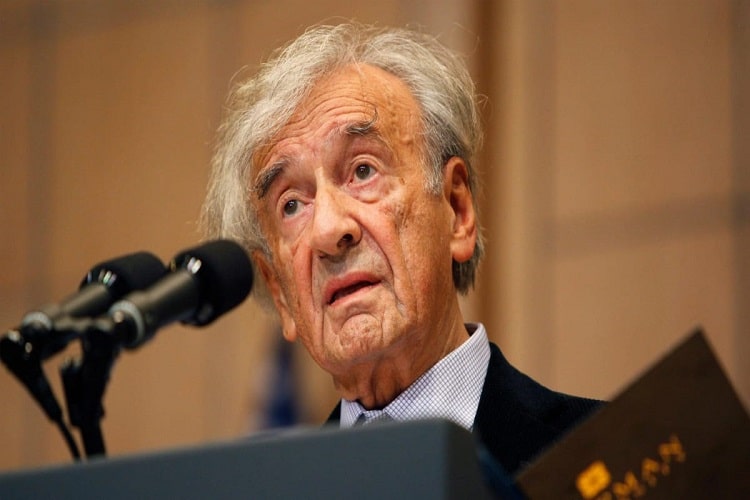Elie Wiesel (30 September 1928 – 2 July 2016) was a Romanian-born American writer, professor, political activist, Nobel laureate, and Holocaust survivor.
Early Life And Education
Elie Wiesel was born on September 30, 1928, in Sighet, a town that was then part of Romania. He grew up in a Jewish family with his parents, Sarah Feig and Shlomo Wiesel, and three sisters. His early life was steeped in the religious traditions of the Hasidic community, and his father instilled in him a strong sense of humanism. The family spoke Yiddish at home, but also knew German, Hungarian, and Romanian. Wiesel’s mother was the daughter of a farmer and a member of the Vizhnitz Hasidic sect, while his father encouraged him to learn Hebrew and read literature, fostering a balance of faith and reason in his upbringing. After the annexation of Sighet by Hungary and the subsequent invasion by Nazi Germany, Wiesel and his family were deported to Auschwitz, a tragic turn that would later profoundly influence his writings. Following the war, Wiesel relocated to France where he studied at the Sorbonne from 1948 to 1951 and began his career in journalism, writing for French and Israeli newspapers.
Career And Achievements
Elie Wiesel, a Romanian-born Jewish writer, left an indelible mark on the world through his literary and humanitarian efforts. His seminal work, “Night,” is a poignant memoir of his experiences in Auschwitz and Buchenwald during the Holocaust. This book, among others, propelled him to the forefront of peace and reconciliation discourse. Wiesel’s contributions were recognized with the Nobel Peace Prize in 1986, acknowledging his message of peace, atonement, and human dignity. His advocacy extended beyond writing, as he became a Messenger of Peace for the United Nations and founded The Elie Wiesel Foundation for Humanity to combat indifference and injustice. Wiesel’s legacy is also honored through numerous awards, including the Presidential Medal of Freedom, the Congressional Gold Medal, and the Legion of Honor. His voice and actions have inspired generations to remember the past and work towards a future without hatred.
Notable Events And Milestones
Elie Wiesel and his father were later transferred to Buchenwald, where his father died shortly before the camp was liberated in 1945. After the war, Wiesel moved to France, where he studied at the Sorbonne and began his career as a journalist. His seminal work, “Night,” which details his experiences in the concentration camps, was published in 1958 and has since become a cornerstone of Holocaust literature. Wiesel’s writings, which include over 40 books, have shed light on the dark corners of human history and provided a voice for those who perished during the Holocaust.
Wiesel’s impact extends beyond his literary contributions. He became a vocal advocate for human rights, speaking out against oppression and injustice worldwide. His efforts were recognized in 1986 when he was awarded the Nobel Peace Prize for his role as a “messenger to mankind” – his message being one of peace, atonement, and human dignity. Wiesel’s teachings and advocacy have influenced policies on genocide prevention, and his foundation, The Elie Wiesel Foundation for Humanity, works to combat indifference, intolerance, and injustice through international dialogue and youth-focused programs that promote acceptance and understanding. Wiesel’s legacy is also evident in his influence on education. He held the position of Andrew W. Mellon Professor in the Humanities at Boston University and taught courses on literature, philosophy, and the dangers of indifference. His voice has resonated with generations of students and readers, inspiring them to confront atrocities and to remember the lessons of the past.
Moreover, Wiesel’s life work has had a profound effect on society’s understanding of the Holocaust and the need for remembrance. His advocacy for the Jewish community and his efforts to ensure that the horrors of the Holocaust are never forgotten have contributed to a broader cultural and societal awareness of the importance of history and memory.
Awards And Honors
Elie Wiesel, a renowned writer and Nobel laureate, received numerous awards and honors throughout his life for his literary work and human rights activism:
- Nobel Peace Prize (1986) for his role in speaking out against violence, repression, and racism.
- Presidential Medal of Freedom, the highest civilian award of the United States.
- Congressional Gold Medal, awarded by the United States Congress.
- Medal of Liberty Award, given by the President of the United States.
- Grand Officer in the French Legion of Honor, one of France’s highest distinctions.
- Commander of the Order of the British Empire (CBE), an honor for contributions to the arts and sciences, work with charitable and welfare organizations, and public service outside the civil service.
- Star of Romania, the highest Romanian order.
- Honorary knighthood in the United Kingdom.
- Multiple honorary degrees from universities around the world.
Additional Resources
Books:
- “Night” by Elie Wiesel, a profound memoir of his experiences during the Holocaust.
- “Dawn” and “Day”, which complete the trilogy, exploring the aftermath and the enduring impact of those events.
- “Open Heart”, where Wiesel reflects on his life after undergoing heart surgery, contemplating mortality and legacy.
Documentaries:
- “Bearing Witness: Elie Wiesel and Night”, a short film by the United States Holocaust Memorial Museum that contextualizes Wiesel’s experiences within the broader history of the Holocaust.
- “Elie Wiesel on The Nature of Human Nature”, a PBS film from 1985 where Wiesel discusses human behavior, indifference, and the importance of remembrance.
Museums:
- The United States Holocaust Memorial Museum in Washington, D.C., which not only honors the memory of the Holocaust but also features Elie Wiesel’s contributions to Holocaust education and remembrance.
- The Florida Holocaust Museum, which has been chosen to house the personal collection of Elie Wiesel, offering a unique insight into his life and work.
These resources provide a multifaceted understanding of Elie Wiesel’s life, his literary work, and his tireless efforts to ensure that the lessons of the Holocaust are never forgotten. They serve as valuable tools for education and reflection on the themes of human rights, dignity, and the power of individual and collective memory.
Observer Voice is the one stop site for National, International news, Editor’s Choice, Art/culture contents, Quotes and much more. We also cover historical contents. Historical contents includes World History, Indian History, and what happened today. The website also covers Entertainment across the India and World.
Follow Us on Twitter, Instagram, Facebook, & LinkedIn

